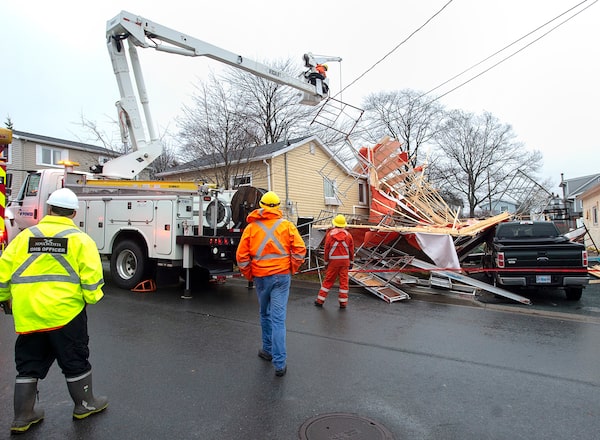Good afternoon, and welcome to Globe Climate, a newsletter about climate change, environment and resources in Canada.
With wicked storms on both sides of the country, we are reminded of the ways climate change impacts our lives through weather. Heavy winds in British Columbia and Nova Scotia downed trees and power lines this week.
But as weather becomes for severe, so does the price tag. Canada’s insurance industry paid out $2.4-billion because of weather events last year, dominated by a flood and a hailstorm in Alberta, continuing a trend of mounting losses amid a warming climate.
In fact, Catastrophe Indices and Quantification Inc. says that 2020 was the industry’s fourth most expensive year since record-keeping began in 1983.
Now, let’s catch you up on other news.

Nova Scotia Power workers remove scaffolding entangled in lines after the collapse of a structure under construction in Dartmouth, N.S. on Tuesday, Dec. 10, 2019.Andrew Vaughan/The Canadian Press
Noteworthy reporting this week:
- Shares surged as Burnaby, B.C.-based Ballard said it will supply fuel cell modules for the demonstration project to test a retrofitted passenger train in Scotland. The hydrogen-powered train will be unveiled in November at the United Nations climate conference in Glasgow.
- Energy firms misled Alberta regulators on cleanup of nearly 60 well sites. Instead there was scattered equipment, holes in the earth, dead vegetation, large divots and evidence of what one regulator called a “really serious case of falsification of documents.” Also: Critics decry reading list issued by Alberta’s energy inquiry commissioner as climate change denial.
- ‘The sexiest tax credit in the land’: Will Canada borrow a U.S. policy to promote carbon capture? Climate columnist Adam Radwanski looks into the appeal.
A deeper dive
KEYSTONE IS JUST THE BEGINNING
Ryan MacDonald is a senior editor at The Globe heading the climate, environment and resources team.
Is Canada about to be eclipsed on climate change action by the United States?
The revelation that U.S. president-elect Joe Biden plans to rescind the Keystone XL pipeline as one of his first acts in office is not exactly a surprise, but is surprising for its speed and conviction.
There is no denying that Canada’s neighbour will help shape this country’s role in addressing climate change – and that means both the challenges and the opportunities.
Mr. Biden has made a $2-trillion promise on getting serious about climate after four years of inaction from Donald Trump. It’s about to get real – and Keystone is just the beginning.
Here at Globe Climate, we’ve been tracking the promises and what they mean for Canada.
Electric vehicles: Canada’s climate plan includes a suite of measures to support electric vehicles, but the most pressing issues will hinge on co-operation with the incoming Biden administration. With a heavily integrated auto sector, a top priority is to consider a continent-wide mandate for electric vehicles. It’s time for Ottawa to ready its case – or be left behind.
More on methane: Mr. Biden has promised aggressive methane pollution limits for oil-and-gas operations. Ottawa has agreements with Alberta, Saskatchewan and British Columbia. Mr. Trudeau could be under more pressure to reopen those federal-provincial agreements.
Carbon tariffs: This is another policy where Ottawa will need to step forward. The government says it is committed to working with the U.S. to ensure that any “carbon adjustment fee” would be part of a continental system.
Sustainable finance: Mr. Biden has promised new requirements for publicly traded companies to disclose climate risks. Canada continues to lag on this front.
The question for Canada now: Is Mr. Biden the ally Canada needs, or we will be forced to follow America’s lead?
- Ryan
What else you missed
- General Motors Canada and national union Unifor announced a deal saying the two sides had reached a preliminary agreement to transform the CAMI plant in Ingersoll, Ont., into a hub for commercial electric vehicle manufacturing – bringing the province one step closer to modernizing its economy.
- Solving the climate crisis by boosting investments in new technologies will be at the centre of the Biden administration’s job creation agenda, the incoming top economic White House adviser said
- Corb Lund, perhaps Canada’s pre-eminent singer about rural life and cowboy culture, is warning Albertans about Rocky Mountain coal mining. He’s met with Alberta Environment Minister Jason Nixon and Energy Minister Sonya Savage to discuss his concerns.
- The Alberta Wilderness Association says it is opposed to the proposed sale of oil and natural gas rights in the Milk River Natural Area and other native grasslands in Southern Alberta.
- Alberta is spending $1.1-million to lobby U.S. lawmakers and launch public campaigns in support of energy trade between the two countries, including the controversial Keystone XL pipeline – a project president-elect Joe Biden has said he would halt.
Opinion and analysis
Should we really tear down the Rogers Centre? The environmental case against demolishing giant buildings
Alex Bozikovic: “This sort of analysis is not usually done by government in Toronto or anywhere else – except Vancouver. That city already requires builders to analyze the carbon that goes into their new structures.”
Pandemic-related drop in emissions will reduce carbon rebates next year
Patrick Brethour: “Why is that? It comes down to the fact that Ottawa’s carbon rebates, designed to offset the added costs households pay from carbon pricing, are actually not rebates. Instead, they are prepayments, with households receiving those funds months ahead of the costs they incur.”
Green investing
Green cred – or greenwash?
Large utilities and energy companies are adding renewable assets to their extensive portfolios of carbon-emitting power plants and oil projects. It may be easy to feel cynical about the trend, but the question is gaining urgency amid what looks like a corporate-wide pivot toward a greener future.
Even a portfolio that focuses almost entirely on renewable energy companies will likely not line up with the goal of many developed nations to attain net-zero carbon emissions by 2050. There may be room in ESG portfolios for carbon emitters if investors are willing to believe that these companies are being authentic in their pursuit of greener assets. However, skeptics can agree on one thing: The corporate tone on climate change is shifting.
- Three ESG stock picks from veteran money manager Francois Bourdon
- ‘Perfect bullish storm’ lies ahead for natural gas, Goldman predicts
Making waves
Each week The Globe will profile someone making a difference in Canada. This week we’re highlighting the work of Brody Robinmeyer, who’s raising awareness about climate justice.

Brody RobinmeyerHandout
I’m Brody Robinmeyer, 31, from Southern Ontario (Ohròn:wakon). I have been exploring ways to build bridges towards creating a positive impact on the climate. I’m currently involved with a project to raise awareness about Ontario increasing the burning of fossil fuels to produce electricity, which would seriously harm our GHG emission goals.
I’ve trained with Al Gore’s Climate Reality Leadership Corps and have collaborated with Ocean Bridge, the Community Permaculture Lab, Hamilton 350, Environment Hamilton, Ontario Clean Air Alliance, the Wilderness Committee and more. I have helped with waterway cleanups and spoken to educate others on the use of more holistic decisions in energy production.
Learning about the connections between climate justice and the “Land Back” movement can help deepen one’s relationship to the land. I believe a big part of the work is finding out where you can fit; how your strengths can best serve you and the community of Earth.
Some starting points:
- Support those on the front lines (e.g. the many Nations and communities defending their land)
- Contacting officials in your local government about drawdown and ecologically regenerative development
- Practice compassion
Do you know an engaged young person? Someone who represents the real engines pursuing change in the country? Email us at GlobeClimate@globeandmail.com to tell us about them.
Photo of the week
A stamp illustrated by Henning Trollback, depicting Swedish climate change activist Greta Thunberg, is pictured in Stockholm, Sweden January 14, 2021.TT NEWS AGENCY/Reuters
Guides and Explainers
- We’ve rounded up our reporters’ content to help you learn about sustainable ways to live life at home, travel, invest, and generally to learn about our species at risk.
- If you like to read, here are books to help the environmentalist in you grow, as well as a downloadable e-book of Micro skills - Little Steps to Big Change.
Catch up on Globe Climate
- Ottawa will still have plenty of gaps to fill in its 2021 climate plan
- A policy primer on Canada’s long-awaited climate plan
- The federal climate plan is belated, bold and brash all at the same time
- Five years later, the Paris Agreement is not aging well
We want to hear from you. Email us: GlobeClimate@globeandmail.com. Do you know someone who needs this newsletter? Send them to our Newsletters page.
 Sierra Bein
Sierra Bein